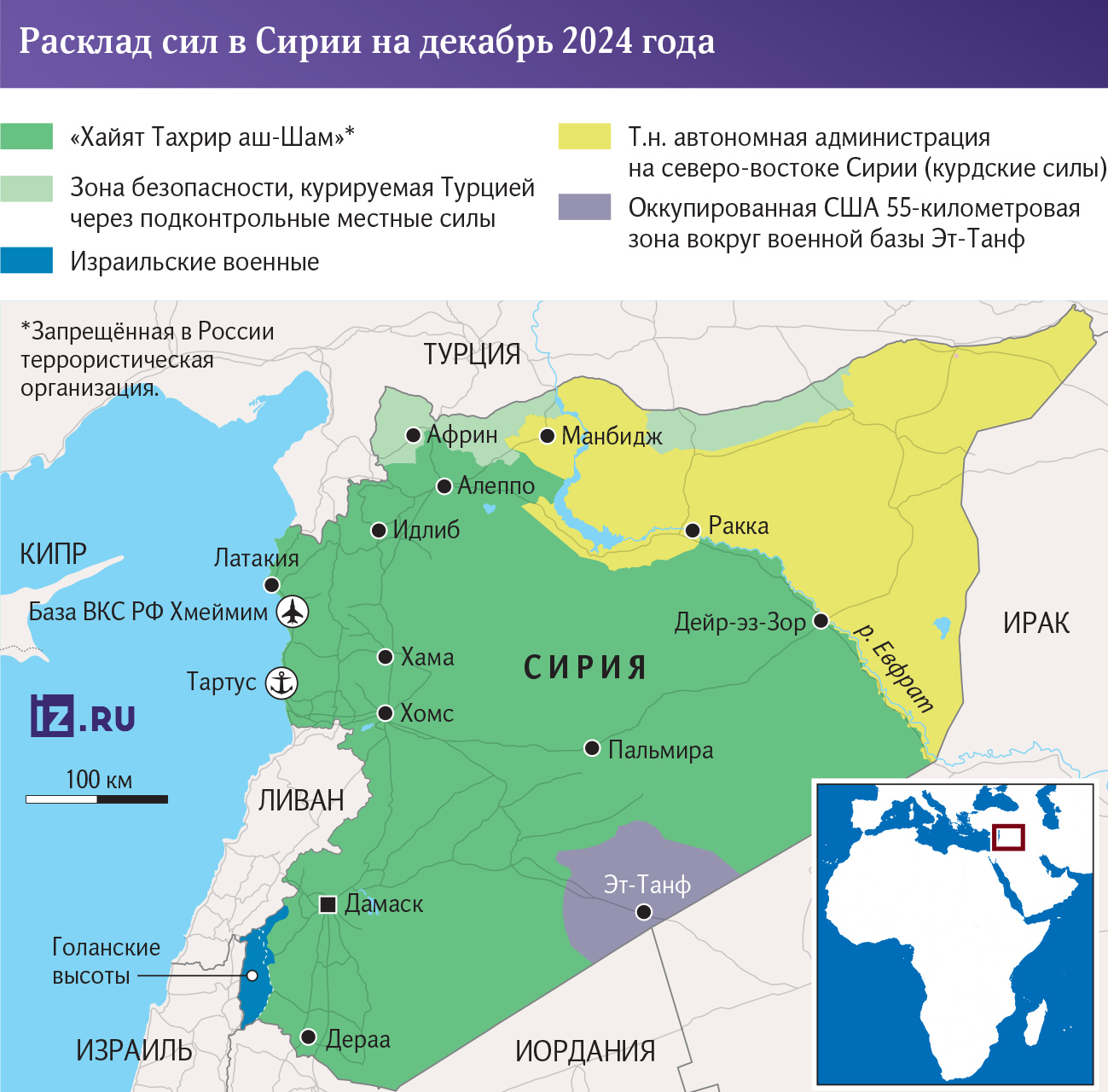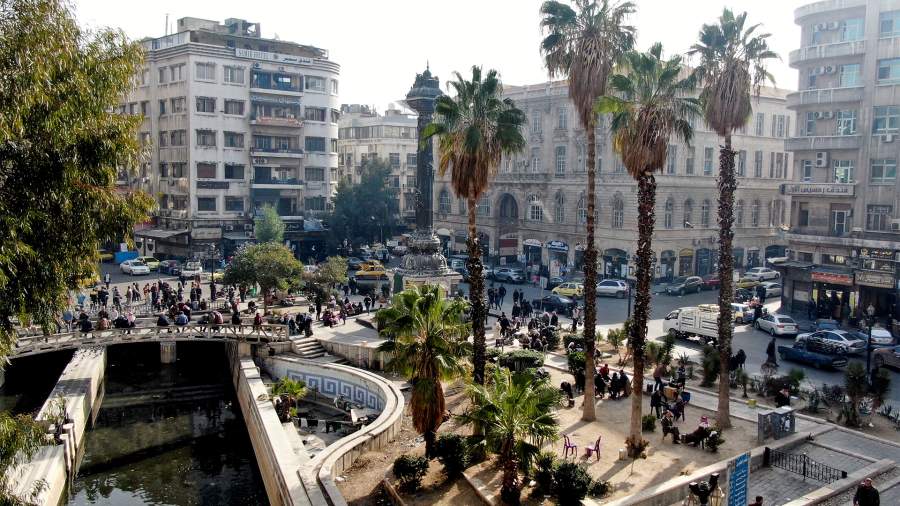Will be everyone's prime minister: few in Syria are happy with new head of government
Mohammed al-Bashir has been tasked by the armed Syrian opposition to form a new Syrian government for a transitional phase. And according to the latest reports, he has already done so. Such swift moves have displeased some factions. According to Izvestia, the militants who captured Damascus are already in contact with Syrian tribes to settle the country. Meanwhile, the "Syrian National Army" with the support of Turkish artillery is fighting against US-backed Kurdish units in the north of the republic. Against this backdrop, Israeli strikes across Syrian territory have intensified - according to local publications, IDF troops have reached the south of Damascus province.
Mohammed al-Bashir became the new prime minister of Syria
In Syria, a gradual transfer of managerial powers from representatives of Bashar al-Assad's government to the new authorities controlled by Hayat Tahrir al-Sham (a terrorist organization banned in Russia) has begun. Izvestia has learned that the armed opposition is already in contact with Syrian tribes as part of the formation of new power institutions.
- "We are in contact with the armed groups to ensure that Syrian clans and tribes play an important role in the process of building a new country, resolving disputes, and promoting civil and public peace in Syria," Mudar al-Asaad, chairman of the Supreme Council of Syrian Tribes and Clans, told Izvestia.
According to him, more than 70% of the country's population belongs to the clan-tribal community.
- Today the tribes have a very big responsibility to return stability, security in Syria, and all this is possible with the cooperation of Arab, Kurdish, Druze, Alawite, Turkmen and other Syrian tribes, especially the Assyrian Christian sects," al-Asaad noted.
Previously, it was assumed that a "transitional body" would be established that would include representatives of the National Coalition of Revolutionary and Opposition Forces (NCRF), an opposition structure dependent on external handlers, primarily Turkey and Qatar. However, the first steps of those who seized Damascus speak more about their unwillingness to share power.
They have instructed Mohammed al-Bashir to form a transitional government. The Syrian news agency SANA published a video of a meeting between al-Bashir, Hayat Tahrir al-Sham leader Ahmed al-Sheraa and Mohammed Ghazi al-Jalali, who served as prime minister under Bashar al-Assad. Late in the evening of December 10, it became known that the acting Prime Minister of Syria said that the composition of the interim government of the country formed, it will operate until March 2025.
Al-Bashir is a politician who in January 2024 began serving as prime minister of the Syrian Salvation Government, the self-proclaimed Idlib administration overseen by Hayat Tahrir al-Sham. A native of Idlib, he served from 2022 to 2023 as minister of development and humanitarian affairs in the same quasi-state government running things in Idlib, where armed gangs were brought from all parts of the country as part of de-escalation agreements.
The first internal divisions within the Syrian opposition were emerging
The pressing question now is whether Hayat Tahrir al-Sham can achieve broader unity with other Syrian opposition forces. Ideological differences remain one of the key reasons for the disunity between the terrorist organization and other groups.
"Hayat Tahrir al-Sham, despite recent peace-loving statements, adheres to a radical Islamist ideology, making it difficult for it to engage with more moderate groups such as the Free Syrian Army (FSA) and Western-backed opposition political structures."
Of course, with a common enemy in the form of Bashar al-Assad and his allies, opposition groups could unite to survive. However, once Damascus is taken under control, the issue of redistribution of power and resources will inevitably arise. The decision to appoint a prime minister has already caused concern among opposition ranks. The move was apparently not coordinated with other factions.
"The Moscow Platform" of the Syrian opposition said that monopolizing the decision based on the mentality of armed groups and jumping the legal framework of the transition process, including UNSC Resolution 2254 and the current Syrian constitution, would seriously damage all the goals people have been fighting for over the past years. "The Syrian people in no way want to go from one individual rule to another," the opposition movement said in a statement.
But Hayat Tahrir al-Sham, as a force claiming supremacy, is unlikely to agree to share power with other factions. In addition, its leader Ahmed al-Sheraa is likely to try to stifle any attempts at competition. This could lead to conflicts.
"The unilateral announcement to appoint the head of the interim government from within the military leadership of Hayat Tahrir al-Sham goes beyond all constitutional and legal norms in transitional situations, and is also not in line with the international resolution, which provides for the formation of an inclusive transitional governing body and creates conditions for inclusive elections," Anas Judeh, founder of the National Construction Movement, wrote on social media.
Syrian columnist Janus Alissa also believes that the appointment of the head of the interim government contradicts all Hayat Tahrir al-Sham's statements and promises. In his opinion, it violates UN Resolution 2254, the duties of guarantor states, the current basic law and precedes the announcement of an interim constitution.
- Syria now needs civilian governance to rebuild infrastructure, restore security and stability to receive refugees and displaced people from around the world. "We need an interim government to reorganize the state, restart official, governmental and private institutions," Mudar al-Asaad, chairman of the Supreme Council of Syrian Tribes and Clans, told Izvestia.
He added that the country should also prepare for the opening of foreign embassies in Damascus.
- There are worthy figures in Syria, even from those who worked under Assad, with scientific, academic and military competence. We need active figures, patriotic individuals who will work to return security and stability to the country," al-Asaad noted.
According to Syria TV sources, the ministers of the Idlib "government" will continue their work in the new cabinet. At the same time, the ATS security services will be dissolved and terrorism laws will be repealed.
The military escalation in Syria continues
After the change of power in Damascus, the focus of attention has shifted to the northeastern regions of the republic, where fierce clashes between pro-Turkish formations - the "Syrian National Army" (SNA) and pro-American Kurdish detachments - the "Syrian Democratic Forces" (SDF) have unfolded. According to Tigran Meloyan, an analyst at the Center for Mediterranean Studies at the National Research University Higher School of Economics, a window of opportunity is now opening for the Kurds to act in the Zaevfratia region in the northeast of the country and create Kurdistan there.
- Therefore, the situation for Turkey, which, as it has been repeatedly stated, has received a "gift", is still far from ambiguous," the specialist noted.
On the afternoon of December 10, local sources reported that the Turkish army and the SNA launched a large-scale military operation in Ain al-Arab in northern Syria. At the moment, Turkish fighter jets and drones are intensively bombing villages in the western countryside of Kobani.
Against this backdrop, the Israeli army has begun active operations in the Golan Heights. The country's Prime Minister Benjamin Netanyahu said that the 1974 agreement, which established a buffer zone, was no longer valid, as the Syrian military left their positions. At the same time, according to statements by Israeli officials, the IDF is expanding the security zone in the Golan.
On Dec. 10, the Syrian newspaper Al-Watan reported that the Israeli military is in southern Damascus province. The IDF, for its part, denied reports of its troops advancing in that direction.
Control over southwestern Syria gives the Israeli military an excellent opportunity to keep Damascus within artillery range, Tigran Meloyan said.
- Israel has always sought to secure key mountain peaks and create a security buffer on Syrian territory against the possible strengthening of Iranian proxies in these positions. Israel clearly assumes that whoever comes to power in Syria, it will be calmer and better if fewer weapons fall into their hands," the specialist noted.
Also, the Israeli Navy destroyed the Syrian navy on the night of December 10, said Defense Minister of the Jewish state Yisrael Katz.
According to Meloyan, one of Israel's goals is to put pressure on the new authorities in Damascus to sign a peace treaty on the terms of the Jewish state, under which the new Syrian leadership will agree to the annexation of the Golan Heights.

Переведено сервисом «Яндекс Переводчик»




